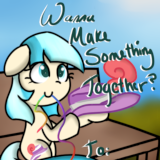Why I Write So Much JoJo Even Though I Don't Like Crossovers Much · 12:10pm Jan 1st, 2018
You're might laugh to hear me say it, but I'm not a very big fan of crossovers. I think a lot of them are artless, like jamming square pegs into round holes. Characters aren't just sets of traits and behaviors, they have themes and patterns trailing behind them. You can drop Anonymous into Equestria without any problem, you can even throw Jenny Everywhere in there, but Shinji Ikari? Kenshiro? Super Mario? It can go south fast, is what I'm saying.
Which is why I never include actual JoJo characters in my stories, ever, at any cost. In fact, if I replaced a few key words here and there, and cast the same dark magics as whoever wrote Fifty Shades of Grey, it might be possible to make them seem like they're not JoJo stories at all. Why, then, do I write not one but five stories that I insist run on the rules of this one particular universe? And just as importantly, why not go for anything else popular?
Well, the point of JoJo for me has never been in the characters, or the plots, or the fashion poses, or the out-of-context jokes, or the awful scanlations. Two things stand out in it above anything else, and they're what inspire me, over and over again.
1. Abilities - the powers that each character gets. They're always original, somehow, always doing something that no other author has done before. So many superheroes are super-strong, or can time travel, or read minds, and yet in an age where we unironically believe there's nothing new under the sun, there are still characters doing things that have never been tried in fiction. If I want a character to have some special magical ability, I'm always going to go for "weaving fabric out of air" before I get to "lifting heavy things". And more importantly,
2. Peripety - a barely-used word born in Aristotle's Poetics, it means the reversal of fortune at the climax of a story. It's rare to see in fiction, especially anything actiony that appeals to younger demographics - a cliffhanger usually gets resolved when the heroes' friends come back for them, or they get lucky, or a new character gets introduced. Cleverness doesn't win in fiction unless the characters don't speak their plan to the audience, and even then there are often snags. But in JoJo, no matter how bulky the characters are, every fight is a battle of the minds. And almost every one of them has some way for the hero to lose without dying - opening their eyes, being touched, losing a race - which they struggle against until it finally comes to pass.
Then, in that moment of total defeat, from where they're standing, in a way that makes perfect sense, they reverse the situation completely and walk away the winner. It's like a magic trick to watch it happen, and to actually do it is above and beyond the most fun thing I've done as a writer. When I tried it the first time and realized that the characters were doing the heavy lifting for me, the same way so many authors claim their characters act independently of them, I felt like I'd discovered something impossible.
And then I realized that it was something even more fundamental than that. JoJo is, at heart, a story about the triumphs of the human spirit over dread and despair, something I truly believe in. And Hirohiko Araki's way of telling stories, his model for having characters solve these problems themselves, is one that drives it home perfectly. You read, you try to figure out how they'll make it out of this one, somewhere in the back of your mind you give up, and then the answer's right there in plain view, often something you might have even seen coming, chiding you for being so faithless.
I write JoJo to get in touch with that, because it presses the same primordial psychological button as so many other things. It's Tim Finnegan returning to life in Finnegans Wake, the resurrection of Jesus in the BIble, chemicals binding together into complex proteins and producing life, the infinite explosion of reality from an eternally empty void, the magician pulling a rabbit out of his hat. Something for nothing, void into existence.
That's how I like to write, although my plots sometimes run away from me and need to be wrangled back. So don't think that you need to go binge seasons of anime to enjoy my stories if you don't want to. It's about trying to tread new ground, trying to recast that ur-spell over and over, flicking the lighter-wheel until it finally comes to life.
And about people with superpowers punching each other, of course, but if Grant Morrison can get away with being all cosmic I'll be damned if I don't give it a try. Pfah.
"The thing is, there's no other way to do it. You can't come up with a terribly clever idea that nobody has ever thought of before without first getting rid of every other idea ever. ... This is what nobody understands about magic. The trick isn't making something. Any old fool can make something. It's not even making something good, although that is, admittedly, a rarer talent. The trick is to have nothing before you have something. The magic part isn't the creation, but the void from which it springs."
-Philip Sandifer, "Recursive Occlusion: An Unofficial Occultism of Doctor Who", pg. 28









I like you.
Beautiful.